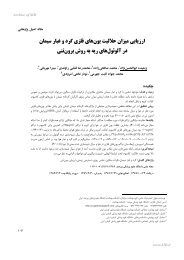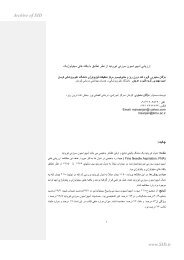- Page 8:
❘❙❚■ ContributorsStephen L
- Page 11 and 12:
Clinical Trials: A Practical Guide
- Page 13 and 14:
Clinical Trials: A Practical Guide
- Page 15:
Clinical Trials: A Practical Guide
- Page 19 and 20:
■■❚❙❘Chapter 1RandomizedC
- Page 21 and 22:
Clinical Trials: A Practical Guide
- Page 23 and 24:
Clinical Trials: A Practical Guide
- Page 25 and 26:
Clinical Trials: A Practical Guide
- Page 27 and 28:
Clinical Trials: A Practical Guide
- Page 29 and 30:
Clinical Trials: A Practical Guide
- Page 31:
Clinical Trials: A Practical Guide
- Page 34 and 35:
❘❙❚■ Chapter 2 | Uncontroll
- Page 36 and 37:
❘❙❚■ Chapter 2 | Uncontroll
- Page 38 and 39:
❘❙❚■ Chapter 2 | Uncontroll
- Page 41 and 42:
■■❚❙❘Chapter 3Protocol De
- Page 43 and 44:
Clinical Trials: A Practical Guide
- Page 45 and 46:
Clinical Trials: A Practical Guide
- Page 47 and 48:
Clinical Trials: A Practical Guide
- Page 49 and 50:
Clinical Trials: A Practical Guide
- Page 51 and 52:
Clinical Trials: A Practical Guide
- Page 53 and 54:
Clinical Trials: A Practical Guide
- Page 55 and 56:
■■❚❙❘Chapter 4EndpointsAm
- Page 57 and 58:
Clinical Trials: A Practical Guide
- Page 59 and 60:
Clinical Trials: A Practical Guide
- Page 61 and 62:
Clinical Trials: A Practical Guide
- Page 63 and 64:
Clinical Trials: A Practical Guide
- Page 65 and 66:
■■❚❙❘Chapter 5Patient Sel
- Page 67 and 68:
Clinical Trials: A Practical Guide
- Page 69 and 70:
Clinical Trials: A Practical Guide
- Page 71 and 72:
Clinical Trials: A Practical Guide
- Page 73 and 74:
■■❚❙❘Chapter 6Source and
- Page 75 and 76:
Clinical Trials: A Practical Guide
- Page 77 and 78:
Clinical Trials: A Practical Guide
- Page 79 and 80:
Clinical Trials: A Practical Guide
- Page 81 and 82:
Clinical Trials: A Practical Guide
- Page 83 and 84:
■■❚❙❘Chapter 7Randomizati
- Page 85 and 86:
Clinical Trials: A Practical Guide
- Page 87 and 88:
Clinical Trials: A Practical Guide
- Page 89 and 90:
Clinical Trials: A Practical Guide
- Page 91:
Clinical Trials: A Practical Guide
- Page 94 and 95:
❘❙❚■ Chapter 8 | BlindingBl
- Page 96 and 97:
❘❙❚■ Chapter 8 | BlindingTh
- Page 98 and 99:
❘❙❚■ Chapter 8 | BlindingAs
- Page 100 and 101:
❘❙❚■ Chapter 9 | Sample Siz
- Page 102 and 103:
❘❙❚■ Chapter 9 | Sample Siz
- Page 104 and 105:
❘❙❚■ Chapter 9 | Sample Siz
- Page 107:
■■❚❙❘Part IIAlternativeTr
- Page 110 and 111:
❘❙❚■ Chapter 10 | Crossover
- Page 112 and 113:
❘❙❚■ Chapter 10 | Crossover
- Page 114 and 115:
❘❙❚■ Chapter 10 | Crossover
- Page 116 and 117:
❘❙❚■ Chapter 10 | Crossover
- Page 118 and 119:
100
- Page 120 and 121:
❘❙❚■ Chapter 11 | Factorial
- Page 122 and 123:
❘❙❚■ Chapter 11 | Factorial
- Page 124 and 125:
❘❙❚■ Chapter 11 | Factorial
- Page 126 and 127:
❘❙❚■ Chapter 11 | Factorial
- Page 128 and 129:
❘❙❚■ Chapter 11 | Factorial
- Page 130 and 131:
❘❙❚■ Chapter 11 | Factorial
- Page 132 and 133:
❘❙❚■ Chapter 12 | Equivalen
- Page 134 and 135:
❘❙❚■ Chapter 12 | Equivalen
- Page 136 and 137:
❘❙❚■ Chapter 12 | Equivalen
- Page 138 and 139:
❘❙❚■ Chapter 13 | Bioequiva
- Page 140 and 141:
❘❙❚■ Chapter 13 | Bioequiva
- Page 142 and 143:
❘❙❚■ Chapter 13 | Bioequiva
- Page 144 and 145:
❘❙❚■ Chapter 13 | Bioequiva
- Page 146 and 147:
❘❙❚■ Chapter 13 | Bioequiva
- Page 148 and 149:
❘❙❚■ Chapter 13 | Bioequiva
- Page 150 and 151:
❘❙❚■ Chapter 14 | Noninferi
- Page 152 and 153:
❘❙❚■ Chapter 14 | Noninferi
- Page 154 and 155:
❘❙❚■ Chapter 14 | Noninferi
- Page 156 and 157:
❘❙❚■ Chapter 14 | Noninferi
- Page 158 and 159:
❘❙❚■ Chapter 14 | Noninferi
- Page 160 and 161:
❘❙❚■ Chapter 15 | Cluster R
- Page 162 and 163:
❘❙❚■ Chapter 15 | Cluster R
- Page 164 and 165:
❘❙❚■ Chapter 15 | Cluster R
- Page 166 and 167:
❘❙❚■ Chapter 15 | Cluster R
- Page 168 and 169:
❘❙❚■ Chapter 15 | Cluster R
- Page 170 and 171:
152
- Page 172 and 173:
❘❙❚■ Chapter 16 | Multicent
- Page 174 and 175:
❘❙❚■ Chapter 16 | Multicent
- Page 176 and 177:
❘❙❚■ Chapter 16 | Multicent
- Page 178 and 179:
❘❙❚■ Chapter 16 | Multicent
- Page 180 and 181:
❘❙❚■ Chapter 16 | Multicent
- Page 183 and 184:
■■❚❙❘Part IIIBasics ofSta
- Page 185 and 186:
■■❚❙❘Chapter 17Types of D
- Page 187 and 188:
Clinical Trials: A Practical Guide
- Page 189 and 190:
Clinical Trials: A Practical Guide
- Page 191 and 192:
Clinical Trials: A Practical Guide
- Page 193 and 194:
Clinical Trials: A Practical Guide
- Page 195 and 196:
Clinical Trials: A Practical Guide
- Page 197 and 198:
Clinical Trials: A Practical Guide
- Page 199 and 200:
Clinical Trials: A Practical Guide
- Page 201 and 202:
Clinical Trials: A Practical Guide
- Page 203 and 204:
■■❚❙❘Chapter 18Significan
- Page 205 and 206:
Clinical Trials: A Practical Guide
- Page 207 and 208:
Clinical Trials: A Practical Guide
- Page 209 and 210:
Clinical Trials: A Practical Guide
- Page 211 and 212:
Clinical Trials: A Practical Guide
- Page 213 and 214:
Clinical Trials: A Practical Guide
- Page 215 and 216:
■■❚❙❘Chapter 19Comparison
- Page 217 and 218:
Clinical Trials: A Practical Guide
- Page 219 and 220:
Clinical Trials: A Practical Guide
- Page 221 and 222:
Clinical Trials: A Practical Guide
- Page 223 and 224:
Clinical Trials: A Practical Guide
- Page 225 and 226:
Clinical Trials: A Practical Guide
- Page 227 and 228:
Clinical Trials: A Practical Guide
- Page 229 and 230:
Clinical Trials: A Practical Guide
- Page 231 and 232:
Clinical Trials: A Practical Guide
- Page 233 and 234:
Clinical Trials: A Practical Guide
- Page 235 and 236:
■■❚❙❘Chapter 20Comparison
- Page 237 and 238:
Clinical Trials: A Practical Guide
- Page 239 and 240:
Clinical Trials: A Practical Guide
- Page 241 and 242:
Clinical Trials: A Practical Guide
- Page 243 and 244:
Clinical Trials: A Practical Guide
- Page 245 and 246:
Clinical Trials: A Practical Guide
- Page 247 and 248:
Clinical Trials: A Practical Guide
- Page 249 and 250:
Clinical Trials: A Practical Guide
- Page 251 and 252:
Clinical Trials: A Practical Guide
- Page 253 and 254:
■■❚❙❘Chapter 21Analysis o
- Page 255 and 256:
Clinical Trials: A Practical Guide
- Page 257 and 258:
Clinical Trials: A Practical Guide
- Page 259 and 260:
Clinical Trials: A Practical Guide
- Page 261 and 262:
Clinical Trials: A Practical Guide
- Page 263 and 264:
Clinical Trials: A Practical Guide
- Page 265 and 266:
Clinical Trials: A Practical Guide
- Page 267 and 268:
Clinical Trials: A Practical Guide
- Page 269 and 270:
Clinical Trials: A Practical Guide
- Page 271 and 272:
■■❚❙❘Part IVSpecial Trial
- Page 273 and 274:
■■❚❙❘Chapter 22Intention-
- Page 275 and 276:
Clinical Trials: A Practical Guide
- Page 277 and 278:
Clinical Trials: A Practical Guide
- Page 279 and 280:
Clinical Trials: A Practical Guide
- Page 281 and 282:
Clinical Trials: A Practical Guide
- Page 283 and 284:
■■❚❙❘Chapter 23Subgroup A
- Page 285 and 286:
Clinical Trials: A Practical Guide
- Page 287 and 288:
Clinical Trials: A Practical Guide
- Page 289 and 290:
Clinical Trials: A Practical Guide
- Page 291 and 292:
■■❚❙❘Chapter 24Regression
- Page 293 and 294:
Clinical Trials: A Practical Guide
- Page 295 and 296:
Clinical Trials: A Practical Guide
- Page 297 and 298:
Clinical Trials: A Practical Guide
- Page 299 and 300:
Clinical Trials: A Practical Guide
- Page 301 and 302:
Clinical Trials: A Practical Guide
- Page 303 and 304:
Clinical Trials: A Practical Guide
- Page 305 and 306:
■■❚❙❘Chapter 25Adjustment
- Page 307 and 308:
Clinical Trials: A Practical Guide
- Page 309 and 310:
Clinical Trials: A Practical Guide
- Page 311 and 312:
Clinical Trials: A Practical Guide
- Page 313 and 314:
■■❚❙❘Chapter 26Confoundin
- Page 315 and 316:
Clinical Trials: A Practical Guide
- Page 317 and 318:
Clinical Trials: A Practical Guide
- Page 319 and 320:
Clinical Trials: A Practical Guide
- Page 321 and 322: Clinical Trials: A Practical Guide
- Page 323 and 324: ■■❚❙❘Chapter 27Interactio
- Page 325 and 326: Clinical Trials: A Practical Guide
- Page 327 and 328: Clinical Trials: A Practical Guide
- Page 329 and 330: Clinical Trials: A Practical Guide
- Page 331 and 332: Clinical Trials: A Practical Guide
- Page 333 and 334: Clinical Trials: A Practical Guide
- Page 335 and 336: ■■❚❙❘Chapter 28RepeatedMe
- Page 337 and 338: Clinical Trials: A Practical Guide
- Page 339 and 340: Clinical Trials: A Practical Guide
- Page 341 and 342: Clinical Trials: A Practical Guide
- Page 343 and 344: Clinical Trials: A Practical Guide
- Page 345 and 346: Clinical Trials: A Practical Guide
- Page 347 and 348: ■■❚❙❘Chapter 29Multiplici
- Page 349 and 350: Clinical Trials: A Practical Guide
- Page 351 and 352: Clinical Trials: A Practical Guide
- Page 353 and 354: Clinical Trials: A Practical Guide
- Page 355 and 356: Clinical Trials: A Practical Guide
- Page 357 and 358: ■■❚❙❘Chapter 30Missing Da
- Page 359 and 360: Clinical Trials: A Practical Guide
- Page 361 and 362: Clinical Trials: A Practical Guide
- Page 363 and 364: Clinical Trials: A Practical Guide
- Page 365 and 366: Clinical Trials: A Practical Guide
- Page 367 and 368: Clinical Trials: A Practical Guide
- Page 369 and 370: Clinical Trials: A Practical Guide
- Page 371: ■■❚❙❘Chapter 31Interim Mo
- Page 375 and 376: Clinical Trials: A Practical Guide
- Page 377 and 378: Clinical Trials: A Practical Guide
- Page 379 and 380: Clinical Trials: A Practical Guide
- Page 381 and 382: ■■❚❙❘Chapter Part V32Repo
- Page 383 and 384: ■■❚❙❘Chapter 32Overview o
- Page 385 and 386: Clinical Trials: A Practical Guide
- Page 387 and 388: Clinical Trials: A Practical Guide
- Page 389 and 390: Clinical Trials: A Practical Guide
- Page 391 and 392: Clinical Trials: A Practical Guide
- Page 393 and 394: Clinical Trials: A Practical Guide
- Page 395 and 396: ■■❚❙❘Chapter 33Trial Prof
- Page 397 and 398: Clinical Trials: A Practical Guide
- Page 399 and 400: Clinical Trials: A Practical Guide
- Page 401 and 402: Clinical Trials: A Practical Guide
- Page 403 and 404: ■■❚❙❘Chapter 34Presenting
- Page 405 and 406: Clinical Trials: A Practical Guide
- Page 407 and 408: Clinical Trials: A Practical Guide
- Page 409 and 410: ■■❚❙❘Chapter 35Use of Tab
- Page 411 and 412: Clinical Trials: A Practical Guide
- Page 413 and 414: Clinical Trials: A Practical Guide
- Page 415 and 416: Clinical Trials: A Practical Guide
- Page 417 and 418: Clinical Trials: A Practical Guide
- Page 419 and 420: Clinical Trials: A Practical Guide
- Page 421 and 422: Clinical Trials: A Practical Guide
- Page 423 and 424:
Clinical Trials: A Practical Guide
- Page 425 and 426:
■■❚❙❘Chapter 36Use of Fig
- Page 427 and 428:
Clinical Trials: A Practical Guide
- Page 429 and 430:
Clinical Trials: A Practical Guide
- Page 431 and 432:
Clinical Trials: A Practical Guide
- Page 433 and 434:
Clinical Trials: A Practical Guide
- Page 435 and 436:
Clinical Trials: A Practical Guide
- Page 437 and 438:
Clinical Trials: A Practical Guide
- Page 439 and 440:
Clinical Trials: A Practical Guide
- Page 441 and 442:
Clinical Trials: A Practical Guide
- Page 443 and 444:
Clinical Trials: A Practical Guide
- Page 445 and 446:
■■❚❙❘Chapter 37Critical A
- Page 447 and 448:
Clinical Trials: A Practical Guide
- Page 449 and 450:
Clinical Trials: A Practical Guide
- Page 451 and 452:
Clinical Trials: A Practical Guide
- Page 453 and 454:
Clinical Trials: A Practical Guide
- Page 455 and 456:
Clinical Trials: A Practical Guide
- Page 457 and 458:
■■❚❙❘Chapter 38Meta-Analy
- Page 459 and 460:
Clinical Trials: A Practical Guide
- Page 461 and 462:
Clinical Trials: A Practical Guide
- Page 463 and 464:
Clinical Trials: A Practical Guide
- Page 465 and 466:
Clinical Trials: A Practical Guide
- Page 467 and 468:
Clinical Trials: A Practical Guide
- Page 469 and 470:
Clinical Trials: A Practical Guide
- Page 471 and 472:
■■❚❙❘GlossaryGlossary453
- Page 473 and 474:
Clinical Trials: A Practical Guide
- Page 475 and 476:
Clinical Trials: A Practical Guide
- Page 477 and 478:
Clinical Trials: A Practical Guide
- Page 479 and 480:
■■❚❙❘AbbreviationsAbbrevi
- Page 481 and 482:
Clinical Trials: A Practical Guide
- Page 483 and 484:
Clinical Trials: A Practical Guide
- Page 485 and 486:
■■❚❙❘IndexIndex467
- Page 487 and 488:
Clinical Trials: A Practical Guide
- Page 489 and 490:
Clinical Trials: A Practical Guide
- Page 491 and 492:
Clinical Trials: A Practical Guide
- Page 493 and 494:
Clinical Trials: A Practical Guide
- Page 495 and 496:
Clinical Trials: A Practical Guide
- Page 497 and 498:
Clinical Trials: A Practical Guide










